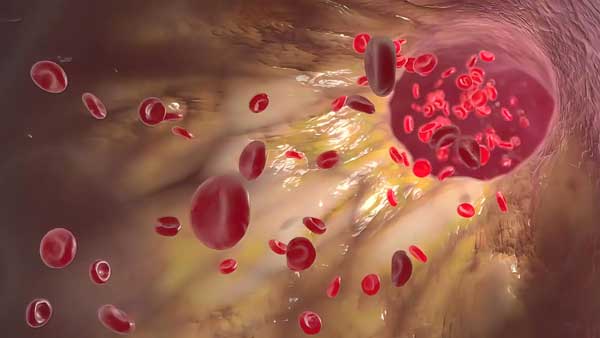Clogged arteries, also known as atherosclerosis, occur when fatty deposits accumulate inside blood vessels. This can lead to blockages and poor circulation, which can cause a host of health problems, such as heart attacks, strokes, and kidney failure. Fortunately, there are several natural ways to unclog arteries. In this article, we’ll explore seven tips from a triple-board certified doctor that can help you improve your heart health.

Eat Foods Rich in Omega-3 Fatty Acids
Omega-3 fatty acids are essential for maintaining a healthy heart and cardiovascular system. They have been shown to have several benefits for heart health, including lowering cholesterol levels, reducing inflammation, and decreasing platelet aggregation. Cholesterol is a type of fat that can build up in the arteries and lead to blockages. By consuming omega-3 rich foods such as salmon, mackerel, tuna, and sardines, you can help to reduce your levels of LDL or “bad” cholesterol in the blood, which can lower your risk of developing clogged arteries.
In addition to lowering cholesterol levels, omega-3 fatty acids have been shown to have anti-inflammatory properties. Inflammation is a natural process that occurs when the body is fighting off an infection or injury. However, chronic inflammation can damage the arterial walls and contribute to the development of clogged arteries. By consuming omega-3 rich foods, you can help to reduce inflammation in the body and protect your arteries.
Omega-3 fatty acids have been shown to decrease platelet aggregation, which can help to prevent blood clots from forming. Blood clots can block blood flow in the arteries and increase the risk of heart attack or stroke. By consuming omega-3 rich foods, you can help to prevent blood clots from forming and improve blood flow throughout the body.
Overall, incorporating omega-3 rich foods such as salmon, mackerel, tuna, and sardines into your diet can have numerous benefits for heart health and help to reduce your risk of developing clogged arteries.
Eat Walnuts
Walnuts are an excellent source of nutrients and have been shown to provide numerous health benefits, especially for heart health. These nuts are rich in antioxidants, healthy fats, fiber, and protein. One of the primary benefits of walnuts is their ability to improve artery health. They contain a high concentration of alpha-linolenic acid (ALA), which is an omega-3 fatty acid that can reduce inflammation and lower cholesterol levels. Moreover, walnuts contain other nutrients like magnesium, potassium, and vitamin E that are essential for maintaining a healthy heart.
Several studies have shown that consuming walnuts regularly can improve the elasticity and flexibility of arteries, which can reduce the risk of developing clogged arteries. Walnuts can also reduce inflammation in the body, which is a significant contributor to heart disease. Furthermore, the antioxidants in walnuts can help prevent oxidative damage to the arteries, which can also contribute to artery clogging.
To incorporate walnuts into your diet, you can try adding them to your morning oatmeal or smoothie, or sprinkle them on top of your salads for a crunchy and nutritious addition. However, it’s important to note that walnuts are high in calories, so you should consume them in moderation. A handful of walnuts a day can provide all the benefits without adding too many calories to your diet.
Eat Berries
Berries are an excellent addition to any heart-healthy diet. These small fruits are packed with nutrients that can help reduce the risk of developing clogged arteries. Berries are high in fiber, which can help reduce cholesterol levels and improve digestive health. They also contain minerals such as potassium, which can help lower blood pressure, and flavonoid antioxidants, which have been linked to reducing inflammation and oxidative stress in the body.
Furthermore, research has shown that the regular consumption of berries can have a positive impact on vascular health. Studies have found that berries can help reduce the accumulation of plaque in the arteries, improving blood flow and reducing the risk of cardiovascular disease. Strawberries, blueberries, raspberries, and blackberries are all excellent options for incorporating more berries into your diet. Try adding them to smoothies, yogurt, or oatmeal for a delicious and healthy snack or breakfast option.
Eat Citrus Fruits
Citrus fruits are not only refreshing and delicious, but they also offer many health benefits. They are packed with essential vitamins and minerals, such as vitamin C, potassium, and folate. Additionally, they contain flavonoids and antioxidants, which can help reduce inflammation and protect against free radicals. By including citrus fruits in your diet, you may be able to improve your heart health and reduce your risk of developing clogged arteries.
Studies have shown that consuming citrus fruits can help reduce cholesterol levels in the body. This is because they contain compounds called limonoids, which have been shown to inhibit the formation of cholesterol in the liver. Furthermore, citrus fruits can help to decrease inflammation in the body, which is a key contributor to heart disease. Inflammation damages the lining of blood vessels, leading to plaque buildup and an increased risk of heart attack or stroke.
To incorporate citrus fruits into your diet, try squeezing fresh lemon or lime juice over your meals, adding orange slices to your smoothies, or making a refreshing grapefruit salad. Drinking citrus-infused water is also a great way to stay hydrated and reap the benefits of these fruits.
Eat Beans
Beans are not only a good source of protein for vegetarians and vegans, but they also offer numerous health benefits. They contain soluble fiber, which binds to cholesterol and removes it from the body. This can help lower the levels of bad cholesterol (LDL) in the blood, which is a major risk factor for heart disease. The high fiber content in beans can also help regulate blood sugar levels, making them a great option for those with diabetes.
Beans are also high in potassium, magnesium, and folate, all of which are important for maintaining heart health. Potassium helps to regulate blood pressure by counteracting the effects of sodium in the diet, while magnesium helps to relax blood vessels and improve blood flow. Folate, on the other hand, helps to lower levels of homocysteine, an amino acid that is linked to an increased risk of heart disease.
Some of the best types of beans for heart health include black beans, kidney beans, chickpeas, and lentils. They can be easily incorporated into meals by adding them to salads, soups, and stews, or even using them as a base for vegetarian burgers and patties.
Eat Vegetables
Green leafy vegetables and cruciferous vegetables are an excellent source of fiber, vitamins, minerals, and antioxidants. The high fiber content in these vegetables has been associated with a reduction in bad cholesterol levels, which can help to prevent the buildup of plaque in the arteries. Moreover, they are also rich in antioxidants such as carotenoids and flavonoids that can protect against oxidative stress and inflammation, both of which contribute to atherosclerosis.
Studies have shown that consuming leafy greens and cruciferous vegetables can improve blood vessel function, lower blood pressure, and reduce the risk of heart disease. You can easily incorporate more of these vegetables into your diet by adding them to salads, smoothies, or stir-fries.
Exercise
Regular exercise has been shown to have numerous benefits for heart health, including reducing the risk of developing clogged arteries. Exercise helps to improve the function of the endothelium, which is the inner lining of blood vessels, and reduces inflammation, which is a major contributor to atherosclerosis. Exercise also helps to maintain a healthy weight, reduce blood pressure and improve insulin sensitivity, which are all important factors in maintaining good heart health.
The American Heart Association recommends at least 150 minutes of moderate exercise per week, which can be achieved by engaging in physical activity for 30 minutes on at least five days per week. This can include a variety of activities such as brisk walking, jogging, cycling, or swimming. Resistance training, such as weightlifting, can also help to build muscle and increase metabolism, which can help to maintain a healthy weight and reduce the risk of developing clogged arteries.
In addition to the physical benefits, exercise has also been shown to have positive effects on mental health, including reducing stress and improving mood. Engaging in physical activity with friends or family can also provide social support and make exercise more enjoyable.
It is important to note that before starting a new exercise regimen, it is recommended to consult with a healthcare professional, especially if you have a history of heart disease, high blood pressure, or other health conditions. They can help to determine the appropriate level of exercise for your individual needs and ensure that you are engaging in physical activity safely.

Conclusion
In conclusion, there are several natural ways to unclog arteries and improve heart health. By incorporating foods rich in omega-3 fatty acids, walnuts, berries, citrus fruits, beans, and vegetables into your diet, and exercising regularly, you can reduce your risk of developing clogged arteries and other heart-related conditions.
Additionally, it’s important to maintain a healthy lifestyle by avoiding smoking and excessive alcohol consumption. Smoking can damage the lining of the arteries and cause inflammation, while excessive alcohol consumption can increase blood pressure and contribute to the development of heart disease.
Moreover, it’s important to manage stress and get enough sleep as both can affect heart health. Chronic stress and lack of sleep can raise blood pressure, increase the risk of developing heart disease and lead to inflammation in the body.
If you have any concerns about your heart health or are experiencing any symptoms, it’s important to consult with a healthcare professional. They can provide you with personalized recommendations and medical treatment if needed.
In summary, making simple lifestyle changes such as eating a heart-healthy diet, exercising regularly, avoiding smoking and excessive alcohol consumption, managing stress, and getting enough sleep can go a long way in improving heart health and reducing the risk of developing clogged arteries and other heart-related conditions.
